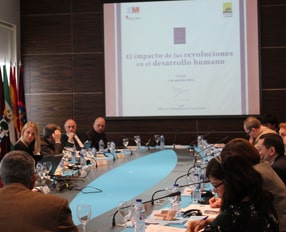
Once completed three years since the armed conflict began in Syria, CEMOFPSC reconvened Middle East experts to analyze the impact of the Arab revolutions in human development in five countries: Egypt, Jordan, Lebanon, Palestine and Syria.
Normal
0
21
false
false
false
ES
X-NONE
AR-SA
MicrosoftInternetExplorer4
/* Style Definitions */
table.MsoNormalTable
{mso-style-name:”Tabla normal”;
mso-tstyle-rowband-size:0;
mso-tstyle-colband-size:0;
mso-style-noshow:yes;
mso-style-priority:99;
mso-style-qformat:yes;
mso-style-parent:””;
mso-padding-alt:0cm 5.4pt 0cm 5.4pt;
mso-para-margin:0cm;
mso-para-margin-bottom:.0001pt;
mso-pagination:widow-orphan;
font-size:11.0pt;
font-family:”Calibri”,”sans-serif”;
mso-ascii-font-family:Calibri;
mso-ascii-theme-font:minor-latin;
mso-fareast-font-family:”Times New Roman”;
mso-fareast-theme-font:minor-fareast;
mso-hansi-font-family:Calibri;
mso-hansi-theme-font:minor-latin;
mso-bidi-font-family:Arial;
mso-bidi-theme-font:minor-bidi;}
The Center for Middle Eastern Studies organized the round table with the name “The impact of revolutions in human development” in the Hall of Ambassadors of the Casa Árabe in Madrid.
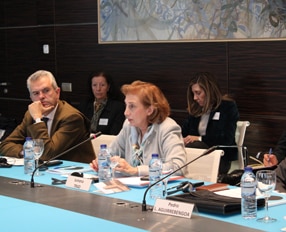 Some of the more renowned voices met to talk about human development in the region on the morning of Tuesday April 1, 2014 to evaluate the achievements and failures that the revolutions known as the Arab Spring have favored.
Some of the more renowned voices met to talk about human development in the region on the morning of Tuesday April 1, 2014 to evaluate the achievements and failures that the revolutions known as the Arab Spring have favored.
The President of the FPSC, Jumana Trad, opened the session by giving the floor to the Ambassador of Lebanon in Spain, Charbel Aoun, who commented that in his country, Syria, it is generating a very high risk for demographic reasons.
The opening session also included Eduardo López Busquets, General Director of Casa Árabe, and Pedro López Aguirrebengoa, Ambassador of Spain.
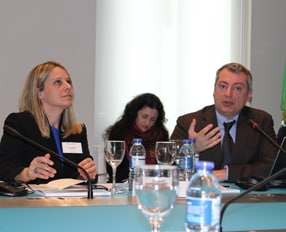
Then the session entitled “The impact of the revolutions in human development” took place with the participation of actors working in the region.
Raquel Martí, Head of the United Nations Relief and Works Agency (UNRWA) in Spain (Palestinian Refugees Camps), emphasized the fact that the most vulnerable group in the Syrian conflict comprise more than 500,000 Palestinian refugees, stressing the difficulty suffering when trying to leave the country.
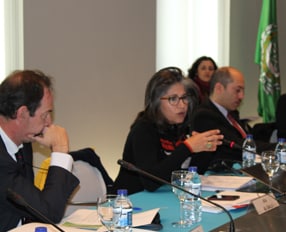
Alia Al Dalli, Regional Director of UNDP in El Cairo (Egypt), reflected on the idea that revolutions were motivated to achieve social and civil improvement and confirmed that donors begin to work with independent associations in her country.
Giuseppe Belsito, Representative of UN Women Country Office for Jordan and Syria (Jordan) stated that the issue of gender is very sensitive in this area, and the Arab countries where the Arab Spring has had more impact are the last on women rights He also denounced the phenomenon that is occurring, selling female minors for premature marriage by their parents and military factions use of the systematic rape of women and children as a war tactic in Syria.
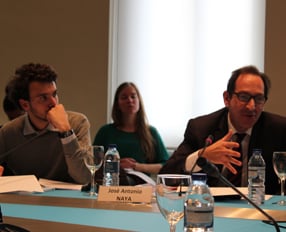
José Antonio Naya, Director of ICU in Lebanon, described the difficulty and precariousness in which thousands of Syrian refugees in Lebanon settled in towns in rural areas generating an untenable situation for these municipalities.
Riccardo Gavioli, FPSC Delegate in Jordan spoke about the revolutions impact on human development.
Karim Hauser, Head of Governance of Casa Árabe, moderated the round table.
A debate followed.
Normal
0
21
false
false
false
ES
X-NONE
X-NONE
/* Style Definitions */
table.MsoNormalTable
{mso-style-name:”Tabla normal”;
mso-tstyle-rowband-size:0;
mso-tstyle-colband-size:0;
mso-style-noshow:yes;
mso-style-priority:99;
mso-style-qformat:yes;
mso-style-parent:””;
mso-padding-alt:0cm 5.4pt 0cm 5.4pt;
mso-para-margin-top:0cm;
mso-para-margin-right:0cm;
mso-para-margin-bottom:10.0pt;
mso-para-margin-left:0cm;
line-height:115%;
mso-pagination:widow-orphan;
font-size:11.0pt;
font-family:”Calibri”,”sans-serif”;
mso-ascii-font-family:Calibri;
mso-ascii-theme-font:minor-latin;
mso-fareast-font-family:”Times New Roman”;
mso-fareast-theme-font:minor-fareast;
mso-hansi-font-family:Calibri;
mso-hansi-theme-font:minor-latin;}
This session is a part of three–day cycle devoted to the elaboration of a report on the impact of the Arab Revolutions in Human Development in the Middle East Region, co-funded by the Regional Government of Madrid. The other two sessions consisted of a panel for the writing of the draft report on Monday March 24, 2014, and a working-breakfast meeting at FPSC headquarter on Friday April 11, 2014.
The panel on March 24 was moderated by Enric Roig, the FPSC’s Director of Humanitarian Aid, and counted with the participation of Jumana Trad, President of FPSC; Sofia Sainz de Aja, Head of Mission of FPSC in Jerusalem; and the consultant Riccardo Gavioli, who talked through videoconference. The objective was to reach a consensual text for the draft report on Human Development.
The working-breakfast meetings that concluded the three-day cycle took place on Friday April 11 2014 at FPSC headquarter and counted with the presence of Yigal Carmon, President and Founder of the Middle East Media Research institute (MEMRI). The objective of the session was validating the definitive text of the report, including the contributions of the panel of April 1. Even though Israel is not included in the report, their strategic location in the region made it relevant to include in the Report some insights on the issue from an Israeli point of view.
RNE issued in one of its bulletins part of the interview with Giuseppe Belsito in the context of the round table organized by the CEMOFPSC (Min. 10): Link
“La marea de refugiados pone a Oriente Medio ante la mayor crisis humana de la historia reciente” by Pedro González to ZoomNews.
[/fusion_builder_column][/fusion_builder_row][/fusion_builder_container]
